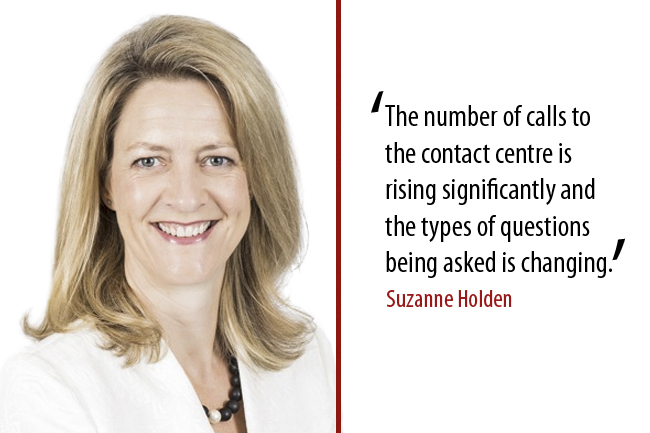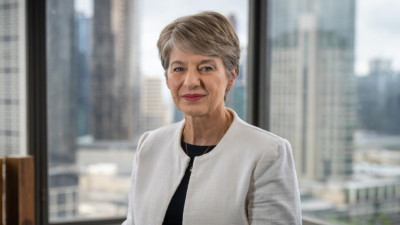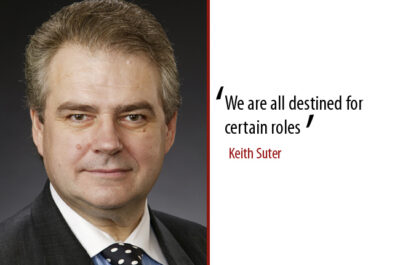Contact centre steps up for value-add in super admin
Superannuation administration is a notoriously tough business. The big operators have to contend with ever-changing regulations, technological challenges and razor-thin margins. Since they are dealing with the retirement savings of the vast majority of Australians, they can’t afford to make too many mistakes, either. Greg Bright spoke with Suzanne Holden, the chief operating officer of Link Group Pensions and Superannuation, about the recent trends.
Suzanne Holden likes to draw an analogy between the evolution of administration of big super funds and the development of the aviation industry in recent years. Both have gone through a big re-focus of attention on customer service whereby technology is handling more and more mundane functions and people are providing more and more value-added services.
Holden joined Link Group, owner of Australian Administration Services (AAS), in 2010 after 22 years in the aviation industry – 16 at British Airways and six at Qantas, where her last position was general manager of airport operations. Furthermore, she was a third generation aviation person. Her grandfather worked for KLM, her father for British Airways and her mother for Scandinavian Airlines.
Throughout her career, she says, she was always managing large customer service operations.
“The airline industry is very dynamic. In customer service they have really cracked loyalty. They also know how a customer is likely to behave and are able to do target marketing very well.”
She left Qantas because she felt she needed a change. “I saw Link Group as an organisation with a clear strategy and also operating in a dynamic industry.”
Link Group is the second-largest administrator, with about 4.5 million members, versus SuperPartners’ 6.3 million. Link Group’s Pension and Superannuation business (which purchased AAS in 2006), however, is much more diversified across both its customer base and its product range. Funds include industry, corporate and government. The company also has a data analytics and services business (Empirics), a financial planning arm (Money Solutions), a software platform for self-administered funds (Syncsoft), and a shareholding research and IT business (Orient Capital). Then there is Link’s big unit registry business for listed companies which is performing strongly this year on a healthy appetite of IPOs.
Unlike the popular perception, Link Group has some very small super fund clients – the smallest having just three members – as well as very large one – REST having about two million members. A lot of the corporates and smaller funds came over when Link took on the administration of the Russell Group’s super funds and the Towers Watson administration clients it had acquired from IBM. Through its diversified services and scale, Link Group is able to handle large numbers of defined contribution members and very complex defined benefit accounts, Holden says.
While the history of consolidation indicates the importance of scale in super admin, it is the newer value-added services which are providing a lot of the growth for Link Group.
“There are three main areas of value- add: the contact centre, the insurance part of our business and the web.
“We continue to drive for operational efficiencies,” Holden says, “but creating new products and services is very important… There is a lot of future growth in online products and services, apps, financial advice and retirement products,” she says.
Plus there is still new business to be won with further outsourcing. Link Group recently won the administration tender for the 330,000-member West Australian Government super fund GESB. The company took on the 140 GESB admin employees in the process.
Holden says that a key part of the new trend in administration shows up in the “contact centre”, which covers all forms of communications with members.
“Our superannuation system is more sophisticated than many overseas markets, and with increasing engagement from members it places a greater demand on both the funds and the administrators to provide that value-,” Holden said.
“The contact centre used to be very transactional,” she says. “Now, the role of contact centre staff has vastly broadened – they are trained to listen closely to the member’s needs recognise the cues for when a member is seeking information on other products within the fund, looking for advice, or if they may be thinking about switching or consolidating out.
Link Group also does some underwriting itself and acts with most of the major group insurers. As members become increasingly aware of their superannuation, the volume of insurance claims, and subsequent premiums, are going up.
Holden says that number of calls to the contact centre is rising significantly and the types of questions being asked are changing. Members are no longer asking for their balance or to change their details, something which they can now easily do online. Instead, members who call usually have more complex enquiries and requests. They want to know about their investment options and other information.
At the administration level, the aim is to be as invisible as possible, with as much straight-through processing that technology will allow. However the introduction of new member directed investment options, allowing for ownership of underlying assets and term deposits, has increased the level of complexity for administrators. While Holden recognises that her big super fund clients are concerned about leakage to SMSFs, she says the trend is “definitely slowing”. She says there are people coming back to big super funds now, having become disillusioned with their SMSF.
Research by Investment Trends tends to support this observation. A recent survey of 2,200 SMSF trustees showed that growth of membership of SMSFs had slowed, while interest in retail and industry funds had picked up.
The 400 people in the Link Group contact centre are able to offer general advice to members and then to provide a “warm handover” – with integrated technology – to Money Solutions advisors for those who require either intra-fund or full advice.
She says the demographics of the contact centre employees is changing. They tend to be older, on average, than previously and more of them have financial services experience when they join the company.
On how funds expect to engage with members in the next few years, Link Group surveyed senior executives of its largest super fund clients last year and presented the results to the annual ASFA conference. About 80 per cent of respondents said that their funds’ website represented the best digital channel to engage members.
Link’s own analysis showed that fund daily website visits increased by 48 per cent between 2009 and 2012. There was also a 38 per cent increase in the number of inbound emails to funds over the two years to July 2013. Funds believed that social media would become increasingly important but only 30 per cent thought it would be a key driver. About 80 per cent thought activity in social media was required to monitor customer complaints and better understand the conversation.
And beyond the evolution of the super administration suite of services, for Link Group there is also another avenue for growth.
While Holden would not be drawn on commenting on any acquisition activity, it’s public knowledge that key competitors SuperPartners, which is owned by five industry funds, and/or the smaller Pillar Administration, owned by the NSW Government, are potentially on the market. SuperPartners’ owners are currently conducting a review of the business and have entertained expressions of interest from potential new owners.
[The SuperPartners story, when it is told, is likely to underscore just how difficult the super admin business is. As has been widely reported, the rebuild of SuperPartners’ core admin system has gone terribly over budget without producing the desired outcome. Any likely buyer, apart from AAS, would probably have to start all over on the new technology spend. And even AAS, which has a completely different system, known as Aaspire, would have to spend millions transferring the data. Furthermore, AAS, with about 1,200 employees, is based in Sydney while SuperPartners, with close to 2,000, is based in Melbourne. GB.]










